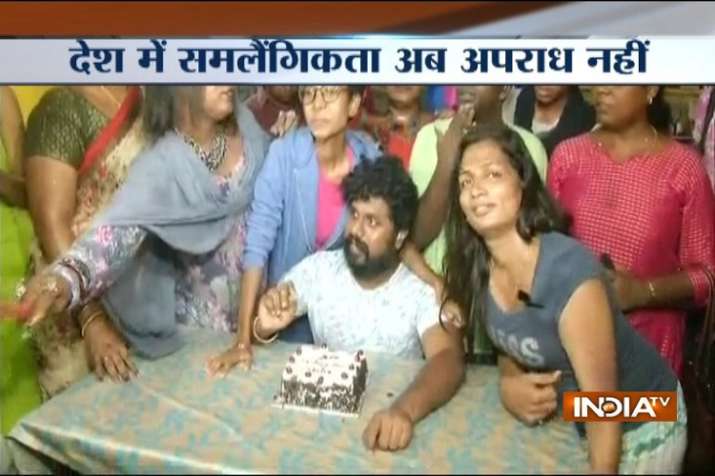
The Supreme Court struck down its own previous judgment declaring Section 377 of the IPC as illegal. (IndiaTV)
In a historic verdict, the Supreme Court on Thursday reversed its own 2013 judgement declaring the controversial Section 377 of the Indian Penal Code, which criminalised consensual gay sex, as illegal. The apex court's verdict triggered a wave of celebrations among the LGBT community across the country. The Supreme Court said Section 377 of IPC was weapon to harass members of LGBT community, resulting in discrimination.
The LGBT community has same rights as of any ordinary citizen. Respect for each others rights, and others are supreme humanity. Criminalising gay sex is irrational and indefensible, the five-judge Supreme Court bench headed by Chief Justice of India Dipak Misra said in its unanimous decision.
"Whoever voluntarily has carnal intercourse against the order of nature with any man, woman or animal, shall be punished with 1[imprisonment for life], or with imprisonment of either description for a term which may extend to ten years, and shall also be liable to fine." This archaic British law dates back to 1861 and criminalises sexual activities against the order of nature and the ambit of this law extends to any sexual union involving penile insertion," Section 377 of the IPC states.
#Maharashtra: People in Mumbai celebrate after Supreme Court decriminalises #Section377 pic.twitter.com/YDabnsP9aO
— ANI (@ANI) September 6, 2018
Who were the petitioners:
The petition in the Supreme Court against Section 377 was filed by five-high profile people who claim that they live in the fear of being punished. The petitions have been filed by Aman Nath, the owner of Neemrana hotels, Navtej Johar, a classical dancer, celebrity chef Ritu Dalmia, former editor Sunil Mehra and restauranteur Ayesha Kapur.
Arguments against strike down of Section 377:
Respondents who were opposing the petitions seeking to decriminalise homosexuality or gay sex -- Apostolic Alliance of Churches and others -- had urged the court to leave the fate of Section 377 IPC to Parliament. The respondents argued that decriminalising the same-sex relationship would have a cascading effect on other statutes including the personnel laws and the spread of dreaded diseases like AIDS.
However, during the last hearing, Justice Rohinton Nariman disagreed with counsel Manoj George, representing Apostolic Alliance of Churches, saying that there will be "no cascading effect" as all such references in other statutes will get deleted.
The cause of the sexually transmitted diseases was not the sexual intercourse but the unprotected sex, Justice Chandrachud said, pointing that a village woman may get infected with the disease from a husband who is a migrant worker.
His remark came as senior counsel K Radhakrishnan sought to present a spectre of widespread HIV and AIDS if Section 377 was decriminalised.
The court said it was duty-bound to strike down a law that is in conflict with the fundamental rights and not to leave it to majoritarian government to address it.
"The moment we are convinced that a law is violative of the fundamental rights, we will strike it down and not relegate it to legislature," said the five-judge constitution bench of Chief Justice Dipak Misra, Justice Rohinton Fali Nariman, Justice A.M. Khanwilkar, Justice DY Chandrachud and Justice Indu Malhotra.
WATCH: Big Supreme Court verdict on Section 377 today
(With inputs from agencies)